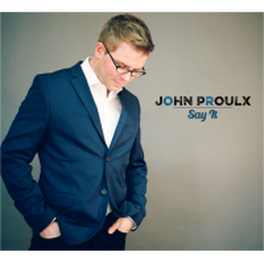
And good thing I did.
Proulx is a very pleasant surprise. He shouldn’t be because he has brought aboard an excellent array of supporting musicians like Larry Koonse on guitar, Bob Sheppard on soprano and tenor sax, Chuck Berghofer on bass, and Joe LaBarbera on drums. Add to them the Gina Kronstadt Strings and you’re set up for a good time.
Proulx himself is the arranger, pianist, and vocalist, excelling at all three positions. Not only that, he has a great sense of choosing songs that are perfect—I said perfect—for the present endeavor. He picks a set list of 10 songs that include known, but not necessarily standard, pieces from the Jazz and Pop catalogs.
He grabs me from the start with his choice of Luis Banfa’s Gentle Rain. Maybe I’m an easy mark but you open with Banfa and I’m your boy.
First off, Larry Koonse introduces the piece with solo guitar. I dig the guy but he works this exceedingly well. Berghofer and LaBarbera are enthralling and Proulx makes room for all of them.
John Proulx, however, steals the show and he should. His piano skills are spot on and his voice is exactly what you would hope to hear.
Michael Franks’ Scatsville is riddled with typical Franks wordplay and Proulx owns it. I mean, he just owns it. I was easy to please with Gentle Rain but Scatsville just reeled me in. Bob Sheppard adds a sweet soprano sax to the piece while the rhythm section propels the track simply and solidly.
Michel Legrand’s The Summer Knows is a lovely, albeit haunting, song. I’ve always had a soft spot for it, I’ll admit, even though it seems like everyone has done it: Sinatra, Streisand, Bennett, and more. I listened to Proulx singing it and immediately remembered watching The Summer of ’42 and hearing it for the first time. Proulx does the song justice but, more than that, he does it honor. I loved it.
He does the same with Watch What Happens—with a fine piano interlude and fascinating cymbal work from LaBarbera—as well as Say It, the title track. Say It is so understated and so well done. I enjoyed the andante left-hand piano motif. Koonse joins in again with splendid guitar work.
I Don’t Worry About a Thing is the great Mose Alison blues shuffle. Bob Sheppard gets to work the tenor sax hotly. Again, Proulx makes this one his own and then turns on the Jazz nocturne in The Last Goodbye.
Good God, this man does not disappoint.
In another turn, Proulx is joined by Melissa Manchester for Stained Glass with predictably wonderful results. I say predictably in a good way. They are so complementary in this romantic (again, in a good way) song. Listening through the album, at this point I was asking myself if things could get any better.
They could.
The penultimate song on the album was the Duke Ellington/Billy Strayhorn number Something to Live For. I have almost everything a human can desire is the opening line. The smoothness of Proulx’s delivery is exquisitely displayed here. The instrumental passages are exceptional and his piano artistry is immensely enjoyable. Berghofer’s bass solo is rich.
The Proulx closes the album with Joni Mitchell’s Both Sides Now. Truth be told, I’ve never been a Joni Mitchell devotee. John Proulx’s delivery of this song actually made me understand the song. I was even moved by it. But don’t tell anybody.
The arrangement here—indeed on all the songs—are impressive. Proulx has got the goods. His piano talents are fantastic. His singing is precisely what I wanted to hear. His musical direction is stellar. I mean, the guy just has it.
Judy Wexler’s production is crystal. The supporting artists deliver. What a great album.
I just can’t get enough of Say It. Now, I want the back catalog.
~Travis Rogers, Jr. is The Jazz Owl
 RSS Feed
RSS Feed
